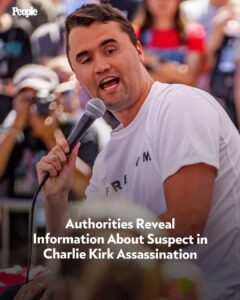CELEBRITY
For days, America waited in silence after ABC pulled Jimmy Kimmel off the air. No one knew what would come next. But when he finally returned to his desk, it wasn’t with jokes. It was with a chilling statement that sent shockwaves through the network and a nation already grieving. He looked into the camera, a man with nothing left to lose, and spoke the words that executives prayed he wouldn’t. Now, the network is in freefall, and the public is rallying behind the man they tried to muzzle. What did he say, and what is the terrifying truth he’s alluding to about Charlie Kirk’s death? The full, explosive story is in the comments.

The air in Studio 5, normally thick with the easy rhythm of laughter and applause, was thin and cold. The familiar neon glow of the Jimmy Kimmel Live! set seemed to cast long, accusatory shadows. At the center of it all sat the show’s namesake, not as a comedian, but as the quiet heart of a gathering storm. For days, since ABC indefinitely suspended his program, a silence had been imposed. But on this night, Jimmy Kimmel broke it. He leaned into the camera, his face etched with a gravity that twenty years of late-night television had never required of him, and delivered a line that landed with the force of a verdict: “The truth has waited far too long.”
The statement, stark and unadorned, was the culmination of a week that had fractured the landscape of American media. It began with the assassination of Charlie Kirk, the provocative and polarizing co-founder of Turning Point USA. As the nation processed the shock, Kimmel, in what would become his final broadcast before the suspension, made a caustic remark linking Kirk’s fate to a “conservative glove,” a line that immediately detonated a political firebomb. Advertisers threatened to pull out, network affiliates were flooded with angry calls, and ABC, citing a need for review and decorum, pulled the plug.
The network’s move was a calculated attempt to contain the damage, to quarantine the controversy. Instead, it created a martyr. The public, already wrestling with a torrent of unanswered questions about Kirk’s death, saw the ABC suspension not as a disciplinary action, but as an act of corporate censorship. In trying to silence one man, the network had amplified the very questions it seemed desperate to avoid.

Kimmel’s return was not a triumphant comeback but a solemn act of defiance. The usual fanfare was gone—no band, no monologue, no cheering audience. Just Kimmel, a desk, and a camera.
“I have laughed with you for twenty years,” he began, his voice low but steady, stripped of its usual irony. “I’ve mocked myself, mocked politics, mocked the news. But this? This cannot be mocked. The truth has waited far too long. And silence is no longer an option.”
The reaction was instantaneous and overwhelming. Before the segment even ended, social media was ablaze. The hashtag #TruthTooLong became the number one trend in the country. On Facebook and X, clips of his seven-word declaration were shared millions of times, often accompanied by captions of support: “They silenced him, but he silenced them first.” The narrative had flipped entirely. The anger once directed at Kimmel’s “conservative glove” comment was now aimed squarely at the network that had tried to muzzle him.

Outside ABC’s headquarters in Burbank, a crowd began to gather, their signs echoing Kimmel’s words. It was a scene reminiscent of a political rally, not a fan gathering for a talk show. The public had chosen a side, and it wasn’t with the corporation
Inside the network, the atmosphere was one of sheer panic. Three sources who spoke on condition of anonymity described a “total meltdown.” “When he said those words, you could feel the building shake,” a senior producer recalled. “Everyone in the control room looked at each other like, ‘We just lost control of the narrative.’” Another programming executive admitted the strategy had backfired catastrophically. “We thought suspending him would contain the fire. Instead, he became the fire. We made him the martyr.”

The crisis deepened when Kimmel, pressed by a guest host about whether the network itself feared the truth, delivered his sharpest blow yet. “When truth becomes too expensive for executives, they call it silence,” he said, a wry, bitter smile touching his lips. “But America isn’t buying that bill anymore.” The studio audience, which had been sitting in tense silence, erupted in a standing ovation. It wasn’t laughter. It was a roar of defiant approval.










